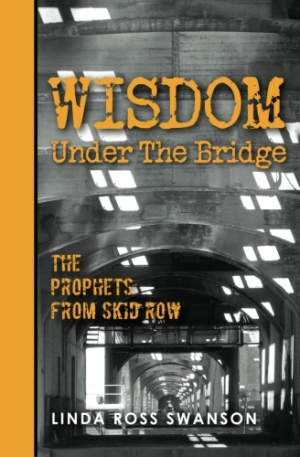Wisdom Under the Bridge
Through moving first-person accounts, Wisdom Under the Bridge raises awareness about the experiences of those struggling with addiction, mental illness, and poverty, and encourages readers not to dismiss the speakers, but to view them as prophets who have valuable stories to pass on.
Swanson, who battles addiction herself, stresses the importance of sharing these traumatic experiences in order to heal from them. In Part I, she provides a compilation of revealing profiles of people in the Portland, Oregon, area who met through their recovery process. Each story is told in the person’s own words through a Wisdom Will, which is based on the Jewish tradition of writing an “ethical will.” By describing their life histories and personal beliefs, they hope future generations will learn from their past triumphs and trials.
The subjects discuss when their addictions began, when they decided to get help, and how they continue to focus on recovery. Their treatment is based on the twelve-step program of Alcoholics Anonymous, and in their wills they attribute their success in recovery to a willingness to adopt religious or spiritual principles to guide them to make better choices. Swanson encourages readers to share their own stories with friends and family by creating their own Wisdom Will, and offers exercises to guide them through the process.
The many wills and letters in Wisdom Under the Bridge are written in simple sentences, often with a stream of consciousness structure that is similar to a diary format. This adds to the uniqueness of the book, as it presents many different voices, but it also offers a glimpse into the very personal, inner thoughts of people struggling with addiction and poverty.
While each story is presented individually, patterns emerge showing there are common events that led these people to engage in destructive behavior, including abusive childhoods often involving parents who were mentally ill or suffering from addiction or both; low self-esteem; and unresolved grief, which is a topic expanded on in Appendix I. Swanson’s husband, who lost a four-year-old son and is a recovering alcoholic himself, discusses the challenges of becoming a self-aware person, which can no longer be avoided once sober.
In Part 2, Swanson offers profiles of the people running the recovery programs, also presented in their own words, including Father Ron Raab, of the Downtown Chapel of St. Vincent De Paul (now named St. Andre Bessette Catholic Church) and the director and cofounder of Sisters of the Road—both common meeting places of those profiled in the Wisdom Wills. These are the sites where they received treatment and assistance and formed relationships with each other and with the counselors who work with them, ultimately finding a supportive community, often for the first time in their lives.
While the stories of adversity are heartbreaking, they are also uplifting because the Wisdom Will writers are hopeful about their futures. Proud of all they have been able to endure and overcome, they are willing to share those stories to benefit others.
Reviewed by
Maria Siano
Disclosure: This article is not an endorsement, but a review. The publisher of this book provided free copies of the book and paid a small fee to have their book reviewed by a professional reviewer. Foreword Reviews and Clarion Reviews make no guarantee that the publisher will receive a positive review. Foreword Magazine, Inc. is disclosing this in accordance with the Federal Trade Commission’s 16 CFR, Part 255.

